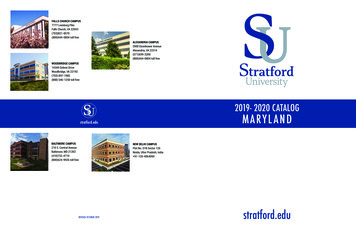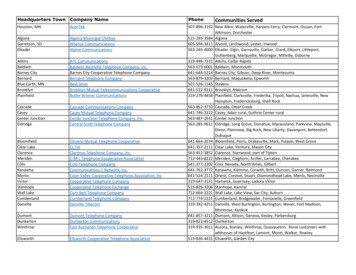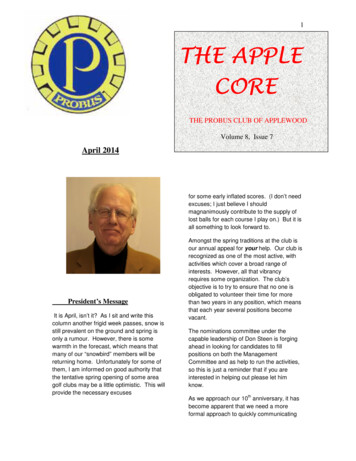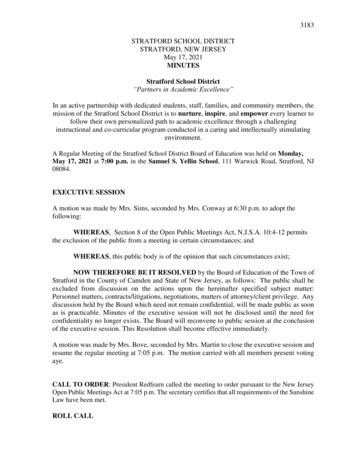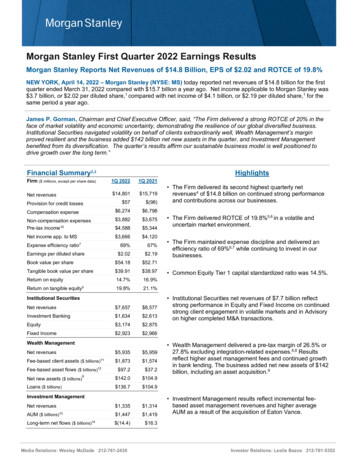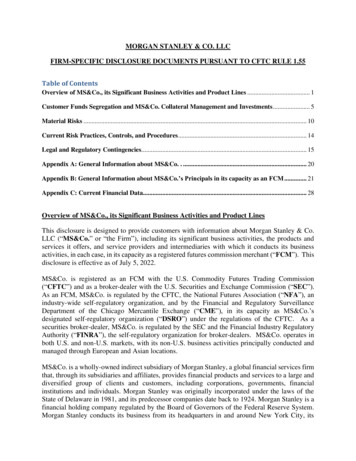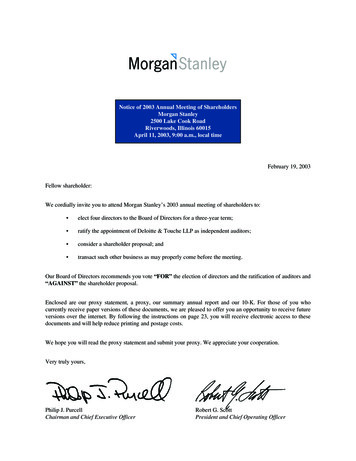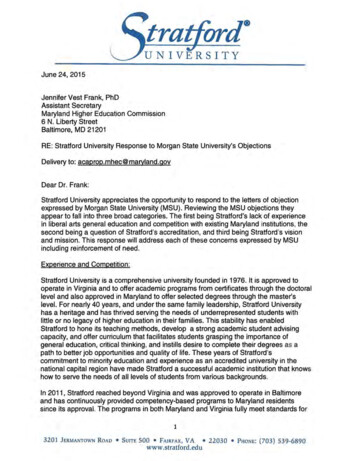
Transcription
UNIVERSITYJune 24, 2015Jennifer Vest Frank, PhDAssistant SecretaryMaryland Higher Education Commission6 N. Liberty StreetBaltimore, MD 21201RE: Stratford University Response to Morgan State University's ObjectionsDelivery to: acaprop.mhec@ marvland.govDear Dr. Frank:Stratford University appreciates the opportunity to respond to the letters of objectionexpressed by Morgan State University (MSU). Reviewing the MSU objections theyappear to fall into three broad categories. The first being Stratford's lack of experiencein liberal arts general education and competition with existing Maryland institutions, thesecond being a question of Stratford's accreditation , and third being Stratford's visionand mission. This response will address each of these concerns expressed by MSUincluding reinforcement of need.Experience and Competition:Stratford University is a comprehensive university founded in 1976. It is approved tooperate in Virginia and to offer academic programs from certificates through the doctorallevel and also approved in Maryland to offer selected degrees through the master'slevel. For nearly 40 years, and under the same family leadership, Stratford Universityhas a heritage and has thrived serving the needs of underrepresented students withlittle or no legacy of higher education in their families. This stability has enabledStratford to hone its teaching methods, develop a strong academic student advisingcapacity, and offer curriculum that facilitates students grasping the importance ofgeneral education, critical thinking, and instills desire to complete their degrees as apath to better job opportunities and quality of life. These years of Stratford'scommitment to minority education and experience as an accredited university in thenational capital region have made Stratford a successful academic institution that knowshow to serve the needs of all levels of students from various backgrounds.In 2011, Stratford reached beyond Virginia and was approved to operate in Baltimoreand has continuously provided competency-based programs to Maryland residentssince its approval. The programs in both Maryland and Virginia fully meet standards for13201JERMANTOWN ROAD SUITE500 FAIRFAX,VAwww.stratford.edu 22030 PHONE:(703) 539-6890
liberal arts general education and maintain excellent student graduation and placementrates. Stratford's places strong focus on student retention and placement. Specifically,for the period from July 1, 2014 to June 30, 2015, the Stratford campus in Baltimoreachieved a 64% year-over-year retention rate and it is climbing. For the same period,the placement rate for graduates was 81%. This placement rate is extraordinary giventhe fact that over 60% of our students had some type of non-violent criminal record andthe fact that the Stratford campus is located just 3 blocks south of the Sojourner Douglass College (SOC) main campus on Central Avenue. Our compassion, academicrigor, adept advising and community outreach have been the key reasons behindresults that Stratford has achieved in Baltimore, and across all our campuses, to date.When the Baltimore International College records were conveyed to Stratford Universityin 2011 , Stratford ensured continuity of operations by properly taking accountability forall student academic records. This effort ensured transcripts could be provided todisplaced students should they need them for employment reasons, continuingeducation, military service or other reasons. The experience gained for assumingcustodial responsibility of records from a closed school is invaluable and extremelyimportant for students.Stratford University does not envision itself competing with MSU or other in-stateschools. The goal of Stratford is not to take away from MSU or other school. Stratfordsimply sees the need to continue to provide employment relevant and quality educationoptions to those students previously served by the former SOC. Stratford Universityintends continue to offer programs to these non-traditional students with a different typeof background, as previously offered by SOC in order to ensure the continuation of theSOC educational legacy and, most importantly, prepare these students for greateremployment opportunity. Stratford is not adding additional programs to the Baltimorecommunity. Stratford desires to continue access by students to the former SOCprograms that these SOC students found convenient and career rewarding.SOC and MSU existed together for many years because they did not serve the samepopulations. Stratford does not directly target high school students. It does, however;require high school graduation as a condition of acceptance. The previous SOC classschedule is similar to what Stratford offers its older, more mature student body. This ispurposely designed to accommodate these students' lifestyles and work schedules.Both SOC and Stratford serve military and international students.As noted in Stratford's initial application, economists indicate most jobs are projected tobe in the occupational clusters of hospitality and tourism, business management andadministration, marketing and health sciences. This is also supported by informationfound in the US Bureau of Labor Statistics career outlook report. Furthermore,researchers such as Dr. Chauncy Lennon, Head of Workforce Initiatives at JPMorganChase also note ". employers are providing fewer opportunities for on-the-job trainingthan they have in the past and as a result, the responsibility for developing skills isshifting from employers to job seekers." This shift creates an opportunity andimperative for universities like Stratford to deliver programs relevant to the skills needed2
by disadvantaged workers and employers. This skills gap threatens Maryland's growthand holds back a workforce eager to learn new skills, be productive, and break the cycleof underemployed or not employed. Stratford believes its programs can address theseshortfalls and Maryland residents given the opportunity to enter a career path and earna good wage.Also as noted in Stratford's initial application, Maryland is the home of three majorfederal government agencies headquarters including the Social Security Administration(estimated 60,000 employees), the US Department of Health and Human Services(estimated 76,000) and the National Security Agency/Central Security Service(estimated 40,000). All of the agencies provide career opportunities as businessanalyst, management program analyst, financial administrators, accountants, andhuman resource managers. These organizations are also heavily dependent on the useof information technology and provide career opportunities in the growing computerinformation technology fields. Stratford's programs prepare students with the knowledgeand skills to be successful in these government career fields.Maryland also is the home of other private and public companies like T. Rowe Price,Booz Allen Hamilton, Northrop Grumman, Lockheed Martin, Under Armour, LeggMason and others. These companies provide career opportunities in management,finances, information technology, accounting, human resources and marketing.According to the Maryland Job Outlook, job opportunities as a personal financial advisorwill grow by 39 percent and computer software engineers will grow by 49 percent. Thereport also indicates the top demanding occupations by education requirements will beoperations managers, accountants, management analyst, computer software engineersand computer systems analysts.With healthcare being Baltimore's largest employment sector there is a constant needfor new and replacement workers who are qualified. As with any large employmentsector there will be a large number of job openings and opportunities. Unfortunately, likemost urban centers there exists a shortage of qualified workers to fill healthcarepositions. This situation is also recognized by the Baltimore American Heart Associationas reported in our initial application supporting documentation. Additionally, the 2011report by the then governor O'Malley's Workforce Investment Board titled PreparingMaryland's Workforce for Healthcare Reform: Healthcare 2020 indicates a need toexpand the need to increase primary care providers.Although institutions across the country may offer similar programs, each institution hasa different focus and student demographics. Stratford University's studentdemographics are generally identical to those students previously serviced by SojournerDouglass College and with the demographics of the Baltimore MSA.Stratford plans to offer employment to selected current SOC employees includingfaculty members and administrative personnel. These projected job offers do not appearto compete with human resources required staff by other local institutions as far as canbe determined based on a review of the employment vacancies at other areainstitutions. It should also be noted Stratford has 11 firm nursing faculty member3
commitment applications, several with credentials at the doctoral level ready to startworking for Stratford. Stratford is not aware of nursing staff shortages at MSU and noneof the 11 applications received by the Stratford Human Resources department are fromemployees who currently work at MSU.Stratford, during the first academic half of 2015, also had 46 Maryland residentscommuting to its Falls Church, Virginia campus to attend its nursing program. There is awell documented need, as known by our students and described in our initialapplication, for additional providers of nursing care services in Maryland.Stratford also has signed clinical agreements with five Maryland organizations, and isactively engaged in 21 additional sites that may become operational with programapproval.Furthermore, approval of Stratford's application opens the door for Stratford to serve thefuture needs of underserved rural Maryland areas where no physical campuses exist.Stratford has extensive experience in operating satellite campuses that could beopened in rural areas with a large population of underserved communities. With theclosure of the SOC satellite campuses several areas are now without convenientlyavailable education.Accreditation:As MSU noted, Stratford University is accredited by the Accrediting Council forIndependent Colleges and Schools (ACICS). ACICS is a national accrediting body. Likeregional accrediting bodies national accrediting bodies conduct comprehensive reviewsof institutions and operate primarily throughout the United States, as do regionalaccrediting bodies. The ACICS is recognized by the Council for Higher EducationAccreditation (CHEA) a national advocate and institutional voice for self-regulation ofacademic quality through accreditation, CHEA is an association of 3,000 degree granting colleges and universities and recognizes 60 institutional and programmaticaccrediting organizations. The Middle States Commission on Higher Education(MSCHE) is also CHEA recognized.Other similarities exist between regionally accredited institutions as well as nationallyaccredited ones. Both can offer a wide range of programs including associate,baccalaureate, masters and/or doctoral degrees. Also, like regional accrediting bodies,the national grant of accreditation encompasses the main campus, branch campuses,other instructional sites, and online programs. Finally, in addition to CHEA recognition,the ACICS is fully recognized by the United States Department of Education (USDE)and the Department of Veterans Affairs (VA). Also, as an ACICS institution, Stratford isheld to rigorous retention and placement standards it must meet. Many accreditingbodies do not have a standing definition of placement to which the institution couldrefer. ACICS does have such a definition and calculation formula. This concept ofplacement standards is being strongly considered by the USDE for broader application.4
In addition to the ACICS accreditation, Stratford maintains additional accreditations. Itsnursing program is accredited by the Commission on Collegiate Nursing Education(CCNE). Like the MSCHE and ACICS the CCNE is officially recognized by CHEA andthe U.S. Secretary of Education as a national accreditation agency. The CCNE is anautonomous accrediting agency, contributing to the improvement of the public's health.CCNE ensures the quality and integrity of baccalaureate, graduate, and residencyprograms in nursing. Stratford University is accredited by the CCNE as are otherschools in Maryland (e.g. Johns Hopkins; Towson; Stevenson; Frostburg State; andothers).The Stratford Culinary Arts program is accredited by the American Culinary FederationEducation Foundation (ACFEF). Accreditation by American Culinary FederationEducation Foundation) assures that a program is meeting standards and competenciesset for faculty, curriculum and student services. ACFEF is also recognized by CHEA.Stratford University has also applied to Accrediting Bureau of Health Education Schools(ABHES). The application has been accepted by ABHES and the evaluation team sitevisits to our campuses have been completed. Stratford expects ABHES accreditation tobe awarded this summer. As a leader in health education accreditation for over 40years, ABHES has been nationally recognized by the U.S. Secretary of Education as aprivate, non-profit, independent accrediting agency since 1968. It has been at theforefront of advancing the quality of health education programs throughout the country.Stratford is also a member of the National Council for State Authorization ReciprocityAgreements (NC-SARA). Stratford understands from a posting on the NC-SARAwebsite that Maryland has introduced and passed legislation for Maryland to join thecouncil. Being a member of SARA indicates a willingness to accept institutionalaccreditation by an accrediting body recognized by the U.S. Secretary of Education assufficient, initial evidence of academic quality for approving institutions for participationin SARA.Stratford has also put a team together to pursue Southern Association of Colleges andSchools Commission on Colleges (SACS) accreditation and will be submitting itsapplication in January, 2016. SACS is the regional body for the accreditation of degree granting higher education institutions in the Southern states. It serves as the commondenominator of shared values and practices among the diverse institutions in Alabama,Florida, Georgia, Kentucky, Louisiana, Mississippi, North Carolina, South Carolina,Tennessee, Texas, Virginia and Latin America and other international sites approved bythe Commission on Colleges that award associate, baccalaureate, master's, or doctoraldegrees.Stratford is indeed also considering applying for the Association to Advance CollegiateSchools of Business (AACSB).Vision and Mission:5
Both the Stratford and SDC visions and missions are similar. SDC was founded out of amovement of community leaders and organizations to create a community-basededucational system to address the needs of underserved adult learners. Stratford'svision and mission is to serve a diverse student body by providing relevant programsthe meet the needs of employers and learners. Stratford University provides access tounderserved geographic and demographic groups and by providing affordable, qualityeducation to its students. Stratford and SDC both draw students generally from the adultpopulation using programs, courses and individual help designed to stimulate themotivation of students and enhance the student's development of positive images. Inboth cases the average student is a person in his or her early/mid-thirties that issimultaneously the head of a household and the primary breadwinner, whose previousexperiences with education have been uneven and oftentimes unfulfilling.In pursuit of this vision and mission, Stratford seeks to ensure:1. a student's career goals can be met by matching students with appropriateprograms of study;2. a quality learning experience by employing faculty who are committed to learningand who demonstrate excellent teaching skills;3. relevant curricula through input from the governing board, advisory boards,academic partners and graduates;4. student success through a comprehensive support program (including testing) toassure correct placement in courses, financial planning, academic assistance,and other needed resources.Stratford University focuses its energies on changing lives, one student at a time. Thehuman spirit has great resilience and capacity to adapt, learn, and aspire. As did SDC,Stratford believes that education can lift the human spirit and provide hope for a brighterfuture. By providing a path to a successful career, education builds self-esteem andself-reliance. In so doing, education addresses the hopelessness which many believe isthe root cause of violent behavior.Finally, please note that Stratford has applied for classification as a for-benefitcorporation within the Commonwealth of Virginia. Stratford has elected to providespecific public benefits, which serve one or more public welfare, religious, charitable,scientific, literary, or educational purposes, or other purpose or benefit beyond the strictinterest of the shareholders, including, but not limited to, the following: To create and deliver quality, educational programs that meet the needs ofemployers in high demand professions;To prepare students to communicate effectively, think clearly, and act ethically tosolve problems in diverse environments;To inspire and guide students as they master the competencies required forcareer success and life-long learning;To be a safe haven where all races, religions, and cultures can communicate andwork together for the common good;6
To meet the social and economic needs of the community by empowering itscitizens to become contributing members of the workforce;To make higher educational available to underserved geographic anddemographic groups.Stratford is committed to the quality of life within the communities that we serve. Ourcorporate for-benefit mission supports that commitment. Our non-profit sisterorganization, The Stratford University Foundation, reinforces this vision.In conclusion, Stratford University believes its plan for continuation of the former SOCprograms does not duplicate those offered by MSU and are consistent with the needs ofMaryland residents and the State's goal to have at least 55% of Maryland residents age25-64 holding at least one degree credential by 2025. Just as Stratford did in 2011 withthe approval of its initial Baltimore campus, Stratford believes it can fill an important roleserving the needs of Baltimore.Thank you again for this opportunity to response and I look forward to a favorableconsideration by the Secretary to this request.Sincerely,CJCfl7Richard R. Shurtz, II, PhDPresident7
as msu noted, stratford university is accredited by the accrediting council for independent colleges and schools (acics). acics is a national accrediting body. like regional accrediting bodies national accrediting bodies conduct comprehensive reviews of institutions and operate primarily throughout the united states, as do regional accrediting


